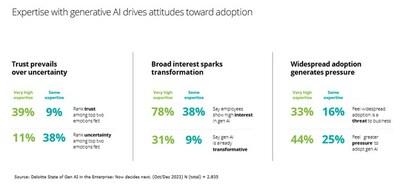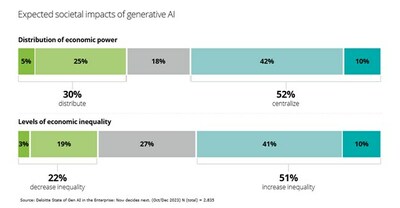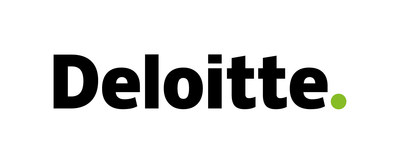New Deloitte survey finds expectations for Gen AI remain high, but many are feeling pressure to quickly realize value while managing risks
Press Releases
Jan 15, 2024
- Three-quarters of respondents expect Generative AI (Gen AI) to transform their organizations within three years
- Only a quarter of leaders believe their organizations are “highly” or “very highly” prepared to address governance and risk issues related to Gen AI adoption
- Only 47% agree that their organizations are sufficiently educating employees on the capabilities, benefits, and value of Gen AI
- More than half are concerned that the widespread use of Gen AI will increase economic inequality (51%)
DAVOS, Switzerland, Jan. 15, 2024 /PRNewswire/ — Building on its annual State of AI in the Enterprise report, today the Deloitte AI Institute™ is unveiling at the World Economic Forum’s annual meeting, the first wave of a quarterly survey, which explores how actions taken now will guide how Gen AI adoption unfolds and if its benefits are fully realized. The State of Generative AI in the Enterprise: Now decides next is based on a survey of more than 2,800 Director to C-suite level respondents across six industries and 16 countries. While respondents have a range of self-reported levels of Gen AI expertise, all are experienced with AI and are piloting or implementing Gen AI in their organizations.
“We’re in the early days of a major technological transformation with Gen AI beginning to drive a wave of innovation across industries,” says Joe Ucuzoglu, Deloitte Global CEO. “The speed, scale, and use cases of Gen AI are breathtaking. Business leaders are under an immense amount of pressure to act, while ensuring appropriate governance and risk mitigation guardrails are in place.”
How early Gen AI experts are driving value
Three-quarters (79%) of respondents expect Gen AI to drive substantial organizational transformation in less than three years. Yet, at the moment, the majority report a strong focus on more tactical benefits, like improving efficiency and cost reduction, rather than things like growth and improving innovation. Like with many new technologies, improving efficiency and productivity was the leading benefit organizations said they were seeking (56%). Areas considered more strategic, like encouraging innovation (29%) and uncovering new ideas and insights (19%) are currently a lower priority.
More than four in 10 (44%) respondents believe they have “high” or “very high” expertise in Gen AI. Among this group, the 9% who report “very high” expertise levels (referred to as early Gen AI experts) reveal how leaders are thinking about and treating Gen AI differently. Nearly three-quarters (73%) of these early Gen AI experts say they are already integrating Gen AI into their product development and research and development, suggesting that they are beginning to use Gen AI for innovation and growth-related purposes. They are also more likely to use Gen AI at a higher rate across business functions.
The early Gen AI experts feel more trust and less uncertainty about the technology and appear to be the most prepared for the changes Gen AI will bring—but they also see greater potential for disruption. For example, compared to respondents with “some level of expertise,” early Gen AI experts are twice as likely to feel that their business or operating model is threatened by the widespread adoption of Gen AI.
Managing talent, governance, and risk are top challenges with Gen AI adoption
Respondents report feeling generally prepared when it comes to strategy and technology infrastructure, but they have lower confidence related to talent, governance, and risk, which are seen as significant barriers to AI adoption.
In fact, respondents cite lack of technical talent and skills as the single biggest barrier to Gen AI adoption. Only 22% of respondents believe their organizations are “highly” or “very highly” prepared to address talent-related issues related to Gen AI adoption. And many are not yet focused on education and reskilling—only 47% of organizations agree that they are sufficiently educating their employees on the capabilities, benefits, and value of Gen AI. The early Gen AI experts, however, are much more likely to focus on educating and reskilling their workforce, and to focus on recruiting and hiring technical talent to drive Gen AI initiatives. For example, 74% of respondents with “very high” Gen AI expertise say they are educating their workforce versus 27% of respondents with “some” expertise.
Similarly, governance and risk are barriers to Gen AI adoption. Only a quarter (25%) of leaders believe their organizations are “highly” or “very highly” prepared to address governance and risk issues related to Gen AI adoption. Respondents’ biggest concerns related to governance are: lack of confidence in results (36%); intellectual property concerns (35%); misuse of client or customer data (34%); ability to comply with regulations (33%); and lack of explainability/ transparency (31%).
Leaders worry that Gen AI will drive greater economic inequality
Although the leaders surveyed are generally excited and enthusiastic about Gen AI’s potential business benefits, they are less optimistic about its broader societal impacts. More than half of respondents expect widespread use of Gen AI to centralize power in the global economy (52%) and increase economic inequality (51%). Additionally, 49% of respondents believe the rise of Gen AI tools/applications will erode the overall level of trust in national and global institutions.
To help address these concerns, the majority of respondents agree there is a need for more global regulation (78%) and collaboration (72%) to manage the responsible widespread adoption of Gen AI.
“Today, Gen AI is at an inflection point where organizations are just beginning to recognize its potential but are yet to see it as a growth catalyst for business. Organizations need to consider Gen AI in conjunction with other AI and technology tools to drive business growth,” says Deborshi Dutt, Artificial Intelligence Strategic Growth Offering lead and principal, Deloitte Consulting LLP. “To help accelerate their path to Gen AI value, organizations should start to reimagine and reinvent how they conduct business to stay ahead in this transformative landscape, while managing risks appropriately. This will require increased collaboration across organizations to foster trust in the responsible and widespread adoption of Gen AI, and a strong focus on education and reskilling people for how this technology is expected to alter how we each work, learn, and collaborate.”
To read the full report please visit: deloitte.com/us/state-of-generative-ai.
About the State of Generative AI in the Enterprise
This is the first of a series of quarterly surveys intended to track the integration of Gen AI in the enterprise. This research builds from Deloitte’s previous State of AI in the Enterprise report which has been running for six years now. This wave of the survey, conducted between October 2023 and December 2023, connected with more than 2,800 AI-savvy business and technology leaders directly involved in piloting or implementing Gen AI at major organizations across 16 countries and six industries including Consumer, Energy, Resources & Industrials, Financial Services, Life Sciences & Health Care, Technology, Media & Telecomm, and Government & Public Services.
The next wave of this survey will continue to track the integration of Gen AI in the enterprise, and will include a deeper focus on innovation, enterprise transformation, and trust.
About Deloitte
Deloitte refers to one or more of Deloitte Touche Tohmatsu Limited (DTTL), its global network of member firms, and their related entities (collectively, the “Deloitte organization”). DTTL (also referred to as “Deloitte Global”) and each of its member firms and related entities are legally separate and independent entities, which cannot obligate or bind each other in respect of third parties. DTTL and each DTTL member firm and related entity is liable only for its own acts and omissions, and not those of each other. DTTL does not provide services to clients. Please see www.deloitte.com/about to learn more.
Deloitte provides industry-leading audit and assurance, tax and legal, consulting, financial advisory, and risk advisory services to nearly 90% of the Fortune Global 500® and thousands of private companies. Our people deliver measurable and lasting results that help reinforce public trust in capital markets, enable clients to transform and thrive, and lead the way toward a stronger economy, a more equitable society, and a sustainable world. Building on its 175-plus year history, Deloitte spans more than 150 countries and territories. Learn how Deloitte’s approximately 457,000 people worldwide make an impact that matters at www.deloitte.com.
![]() View original content to download multimedia:https://www.prnewswire.com/news-releases/new-deloitte-survey-finds-expectations-for-gen-ai-remain-high-but-many-are-feeling-pressure-to-quickly-realize-value-while-managing-risks-302033414.html
View original content to download multimedia:https://www.prnewswire.com/news-releases/new-deloitte-survey-finds-expectations-for-gen-ai-remain-high-but-many-are-feeling-pressure-to-quickly-realize-value-while-managing-risks-302033414.html
SOURCE Deloitte Global






